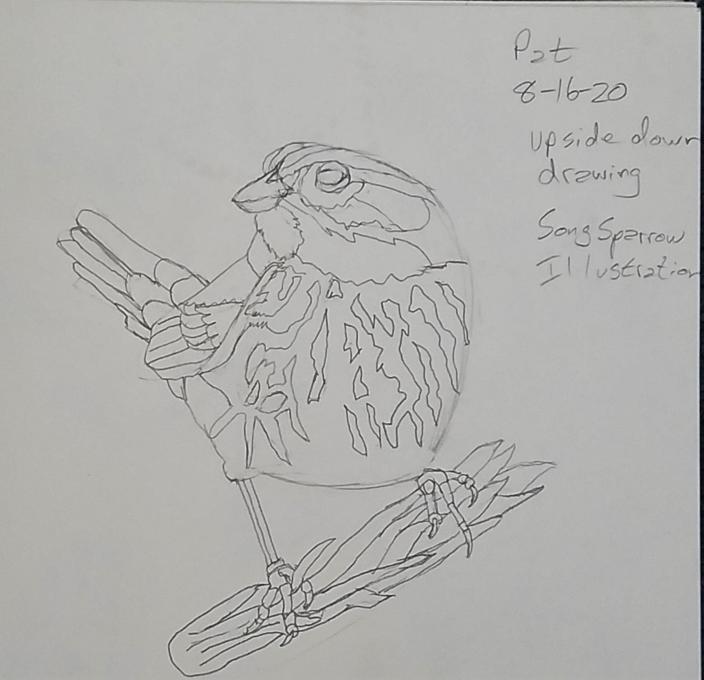The Cornell Lab Bird Academy › Discussion Groups › Nature Journaling and Field Sketching › Drawing What You See – Upside Down Drawing
-
This exercise requires patience and focus. I had the most difficulty with the splotchy
 belly shapes because they are more irregular and "floating" vs connected by other lines.
belly shapes because they are more irregular and "floating" vs connected by other lines. -

-
@Candy I was so , I forgot the tail!
-
-
 At first I really found this lesson enjoyable. But then about halfway through I realized that some of my proportions were really off. I got rather frustrated and and wanted to erase half of what I had done. Then my husband reminded me that this is a learning process and I should just finish it. I can always go back and try it again later, continuing to improve with each try. I stepped away from it for a couple months, then came back and finished it. Overall once I was done I am really happy with the results.
At first I really found this lesson enjoyable. But then about halfway through I realized that some of my proportions were really off. I got rather frustrated and and wanted to erase half of what I had done. Then my husband reminded me that this is a learning process and I should just finish it. I can always go back and try it again later, continuing to improve with each try. I stepped away from it for a couple months, then came back and finished it. Overall once I was done I am really happy with the results. -
I had fun with this exercise - it forced me to take my time and look at the shapes in relation/proportion to each other - rather than thinking about the whole subject. It came out better than I thought it would!

-
This was challenging and fun! I started out seeing the sparrow but after I will I got so focussed on the drawing I started to see only lines relating to other shapes or lines. A really helpful exercise.

-
It was difficult, and I had to keep focused! I was surprised that when I flipped it around it actually looked much like the bird I was drawing. The details were hard to do (markings on chest). I guess that tells me that if you really draw exactly what you see and don't be limited by the overall appearance, you can be accurate :)
-
Fun and hard. Had to really concentrate on the shapes, not an upside down bird : )


-
Pat M., October 27, 2020 It was difficult, but a good workout. Bird proportions dicey.

-
 I have done this before and it really is amazing. I did have difficulty keeping my place on the subject. Good exercise.
I have done this before and it really is amazing. I did have difficulty keeping my place on the subject. Good exercise. -
This was so hard for me!! I ended up with a headache. No joke. I had a really hard time with proportion and negative space - it was like my mind could not adjust to the image being upside down. While the exercise made me slow down, I found that I started to give up at the end and hurry........this was the hardest so far.

-
I haven't tried upside down drawing in a very long time, and again, it forced me to slow down, and use all those skills we've learned. After awhile it just became like doing a puzzle - here's a squiggle, it points at that line, it's halfway down, under the bulby thing, same length as this line. But wow those islands were tricky.

-
Beautiful and very accurate!
-
You did great!!
-
-
This was quite challenging and I had to work very slowly. The sparrow turned out better than I anticipated. The marks on the stomach got a little confusing.

-
 Needed more patience and quiet to do it right. Did try to work as shapes but believe I need to draw it larger to see the smaller details
Needed more patience and quiet to do it right. Did try to work as shapes but believe I need to draw it larger to see the smaller details -
Let death be the moment when I turn the picture of my life over and marvel at the results. This exercise was a real gift to me...trusting, enjoying, and "mov(ing) through" without mental baggage/memory. Thank you.

-
That's a neat message! Well done!
-
-
I found this exercise challenging. It took awhile. I tried to concentrate on the relationships between shapes, but I never quite disconnected from seeing a bird. I'm pleased with the results and could keep tweaking it.

-
Drawing the branch felt easy to start but the closer I got to the head the more challenging it became. I ended up putting my finger on the computer screen to remember where I was. But the more time I spent looking at the lines while drawing, the more accurate the drawing became. I have to say I am super happy with the result.

-
What a great exercise! Very quickly I found that I had to concentrate on the subject, to the point of seeming to do blind contouring drawing. Super fun.

-
This exercise took quite awhile for me. After three tries starting with the branch end, I found it worked to start with the negative space between the bird and the branch. I am not sure I ever totally disengaged from the fact it was a bird, but as I moved from shape to shape it became easier to concentrate on just the shapes and their placement. I think my result is pretty good, but some of the proportions aren't right. Enjoyed this once I got past the start.

-
 This was challenging for me and when I first started drawing I wasn't sure I would be able to do it. I'm pleased with the results in that I did focus on the negative spaces while drawing and got all of my lines and shapes. This exercise made me slow down and really look at shapes and negative spaces. I found I had to print the picture because it was too hard to look back and forth at the computer screen.
This was challenging for me and when I first started drawing I wasn't sure I would be able to do it. I'm pleased with the results in that I did focus on the negative spaces while drawing and got all of my lines and shapes. This exercise made me slow down and really look at shapes and negative spaces. I found I had to print the picture because it was too hard to look back and forth at the computer screen. -
Difficult. I saw the sparrow as it was, in the photograph.
 The form of my bird was way off, and I’m not sure what went wrong.
The form of my bird was way off, and I’m not sure what went wrong. -
It took a long time for me to sketch the Song Sparrow and it was challenging. I tried to look at the subject as it was. It eventually all came together and I was surprised it turned out as well as it did. It was definitely a fun exercise.


-
 This was difficult ! The longer I drew the more I focused on shapes, lines and portions.
This was difficult ! The longer I drew the more I focused on shapes, lines and portions. -

-
I'm having a hard time figuring out how to get the foto and words in the same submission.... I found drawing the bird upside down excruciatingly slow, and I think I am going to learn patience. It turned out very good in my opinion, so I'm happy. I am enjoying this course.

-

 The upside down drawing was not too hard until I got to the belly, then I did not have a way to make associations and relationships, to label and fit in what I was drawing.
I will try understanding the belly feathers again later.
The upside down drawing was not too hard until I got to the belly, then I did not have a way to make associations and relationships, to label and fit in what I was drawing.
I will try understanding the belly feathers again later. -
This was kind of fun, although it took me quite a while to complete. In the beginning, I saw shapes and lines. I began with a quick very rough outline of the branch and the bird shape so I would have a proportion that approximated the space on my paper. Then I started with the same part of the branch you did in the video and it was line to the break, then the shape began to have a relationship piece by piece, then it was all about shapes and trying to see beyond the line break how they came together or disappeared in to a new shape. Next I did the outline of the bird’s body to the beak, I got lost in the cap and the beak. Had to go down to the right leg up and it was it was shapes, lines and relationships from there to the end. Pat

Read More:
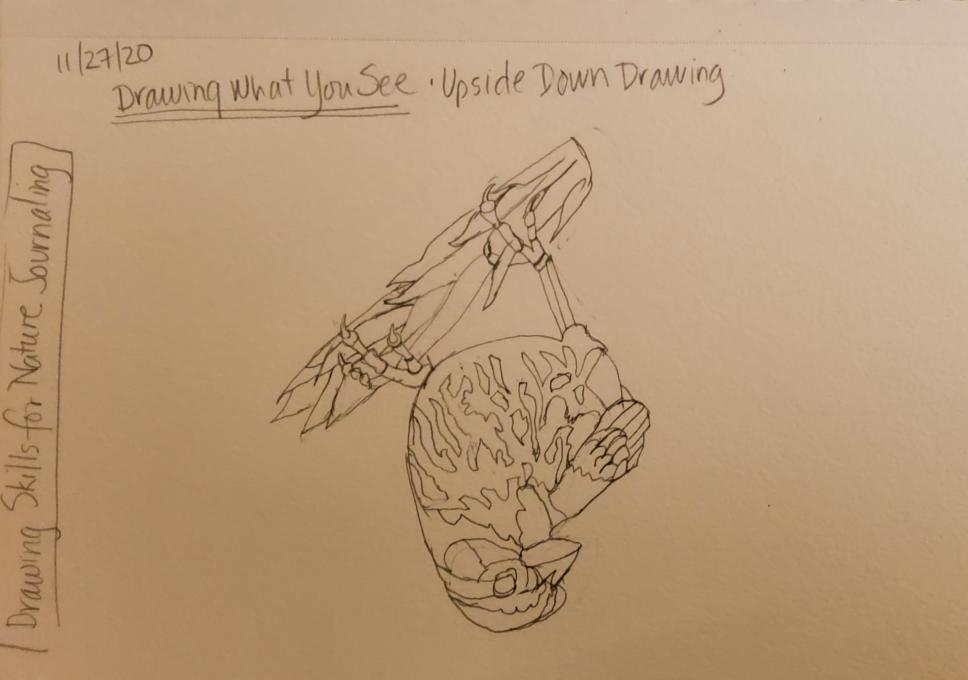 belly shapes because they are more irregular and "floating" vs connected by other lines.
belly shapes because they are more irregular and "floating" vs connected by other lines. 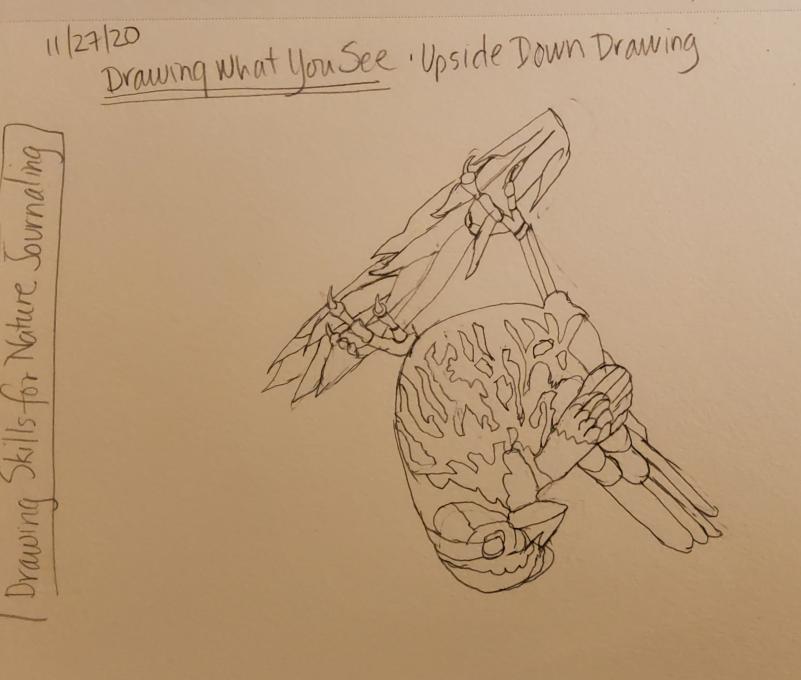
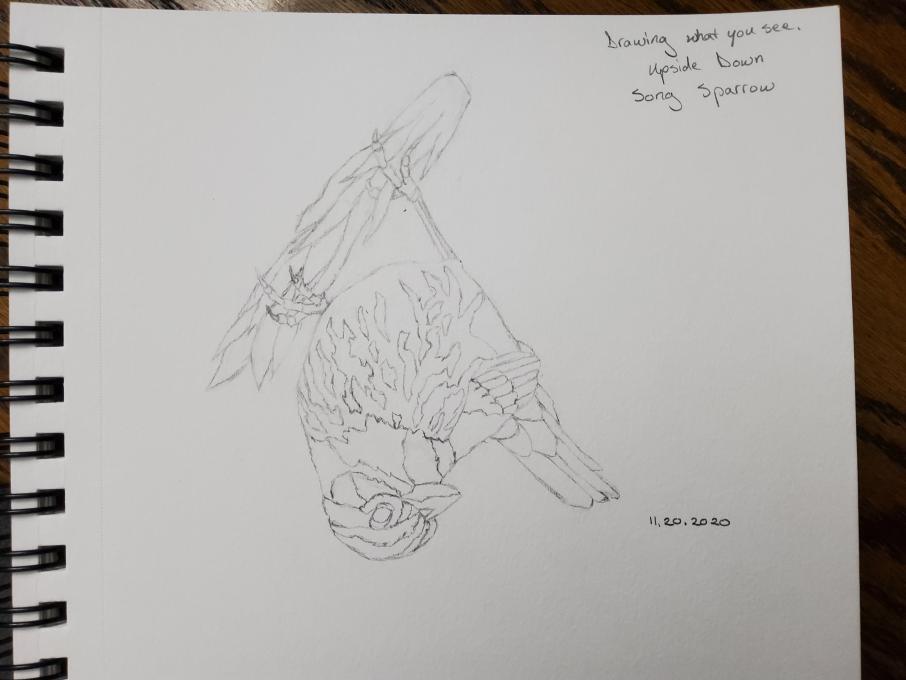 At first I really found this lesson enjoyable. But then about halfway through I realized that some of my proportions were really off. I got rather frustrated and and wanted to erase half of what I had done. Then my husband reminded me that this is a learning process and I should just finish it. I can always go back and try it again later, continuing to improve with each try. I stepped away from it for a couple months, then came back and finished it. Overall once I was done I am really happy with the results.
At first I really found this lesson enjoyable. But then about halfway through I realized that some of my proportions were really off. I got rather frustrated and and wanted to erase half of what I had done. Then my husband reminded me that this is a learning process and I should just finish it. I can always go back and try it again later, continuing to improve with each try. I stepped away from it for a couple months, then came back and finished it. Overall once I was done I am really happy with the results. 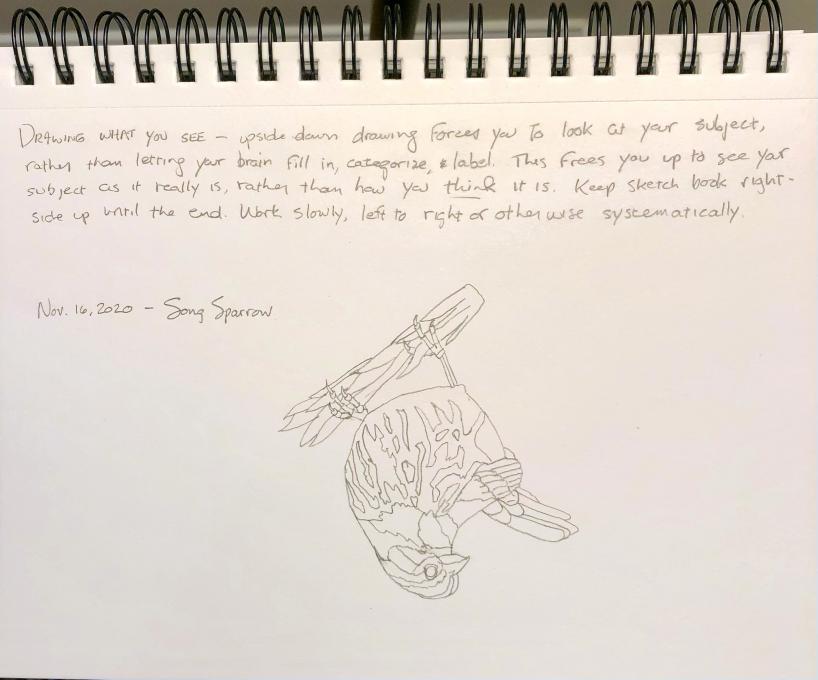
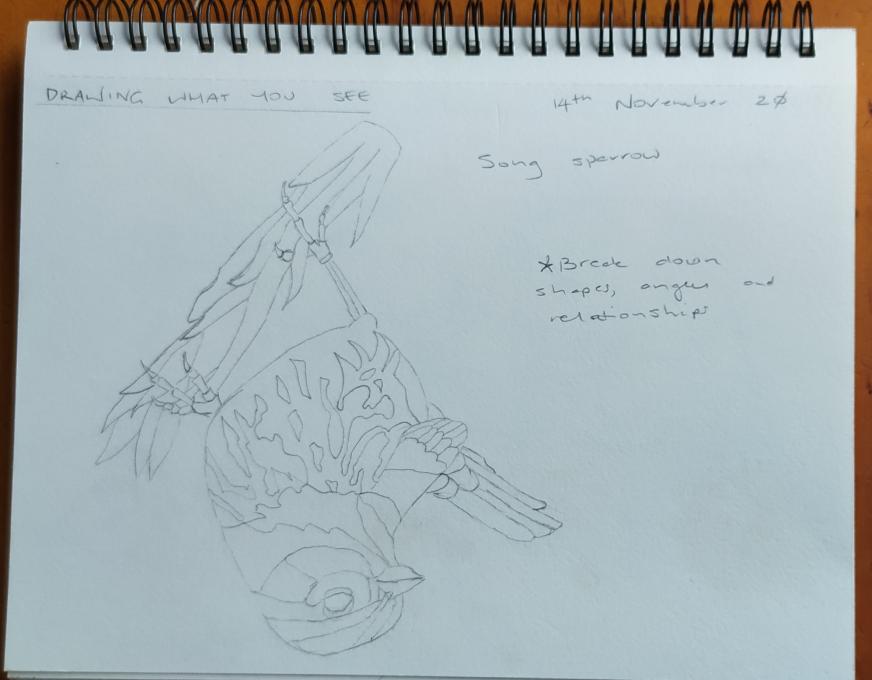
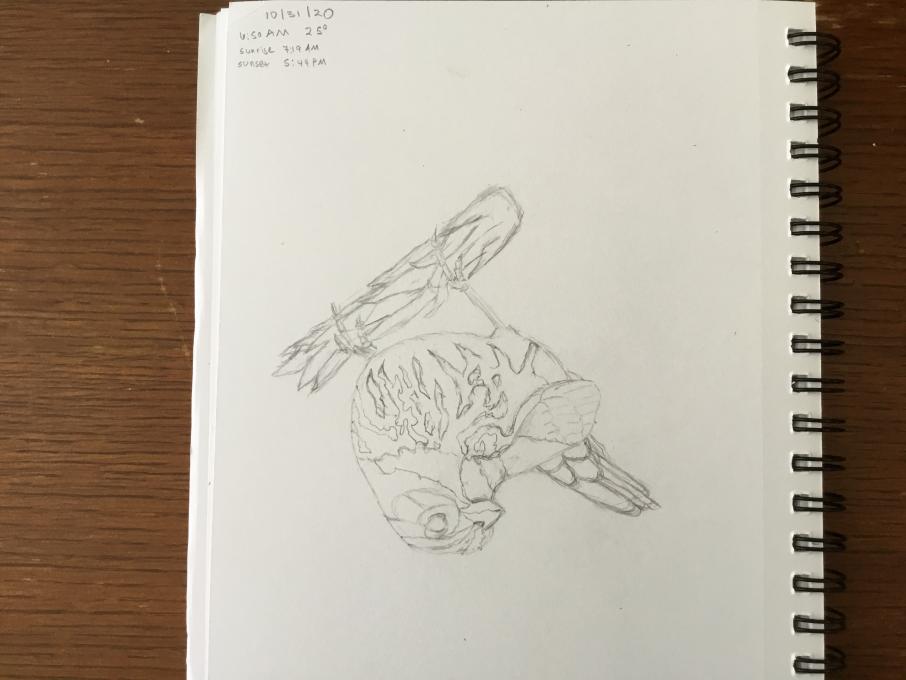
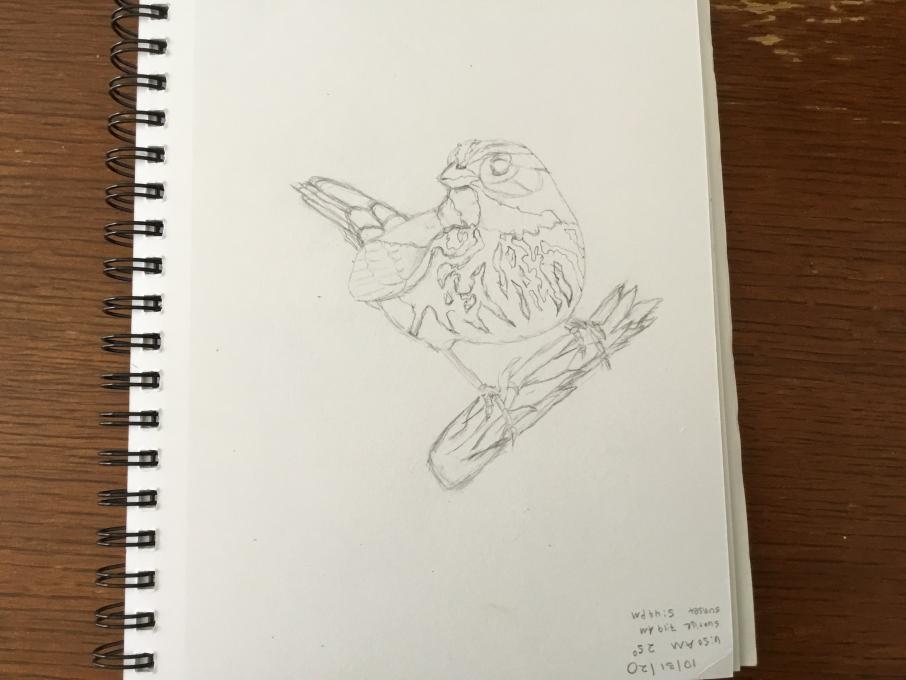
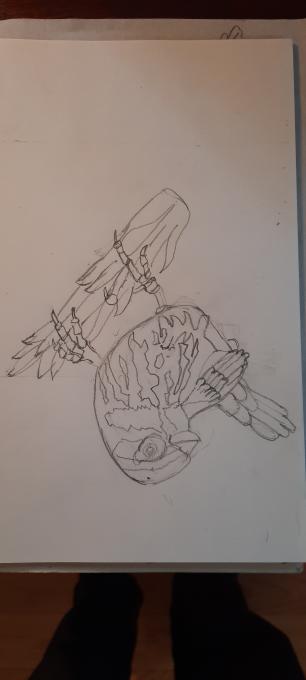
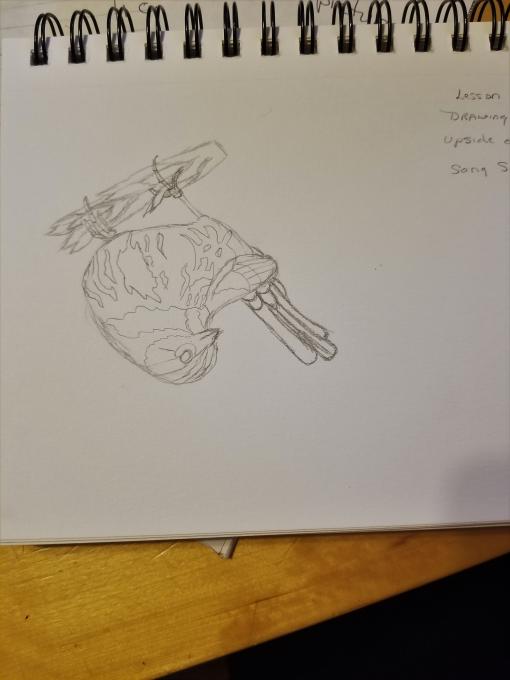 I have done this before and it really is amazing. I did have difficulty keeping my place on the subject. Good exercise.
I have done this before and it really is amazing. I did have difficulty keeping my place on the subject. Good exercise. 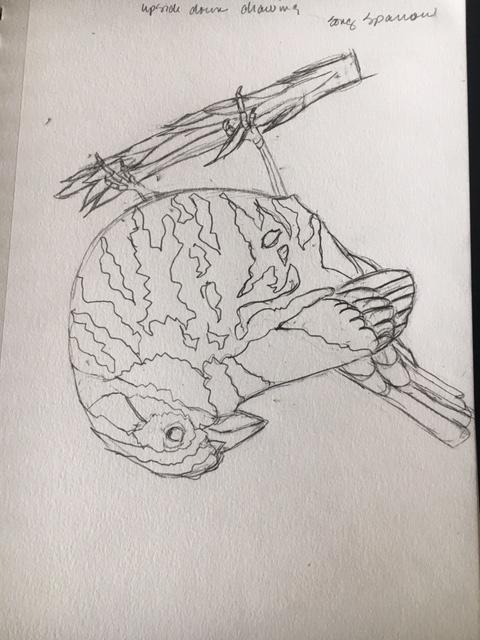
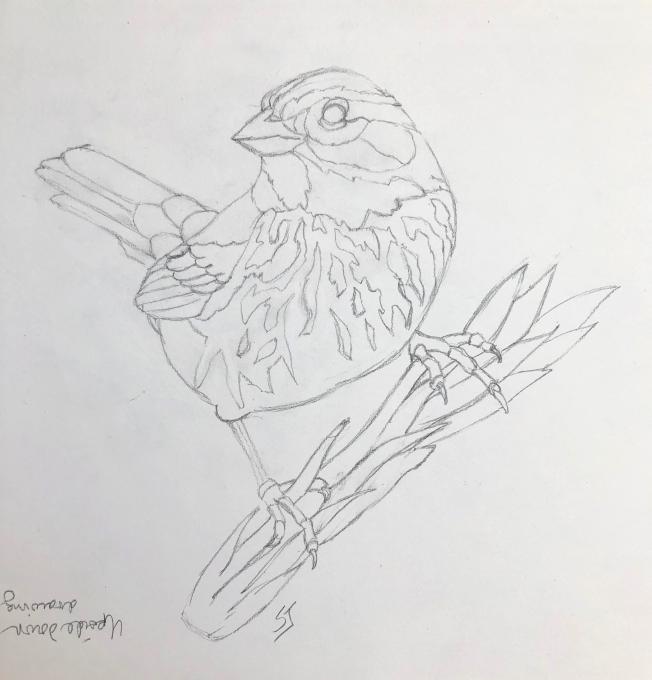
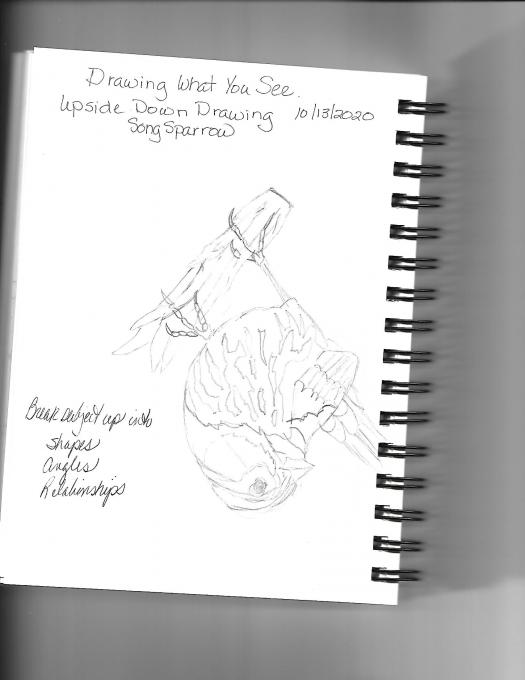
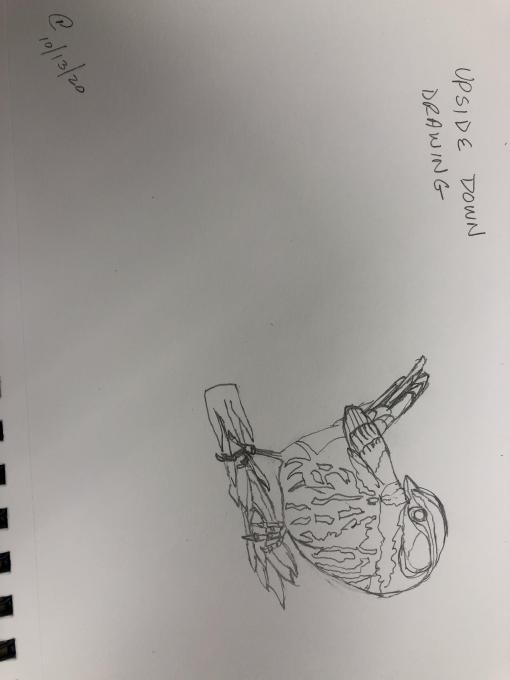 Needed more patience and quiet to do it right. Did try to work as shapes but believe I need to draw it larger to see the smaller details
Needed more patience and quiet to do it right. Did try to work as shapes but believe I need to draw it larger to see the smaller details 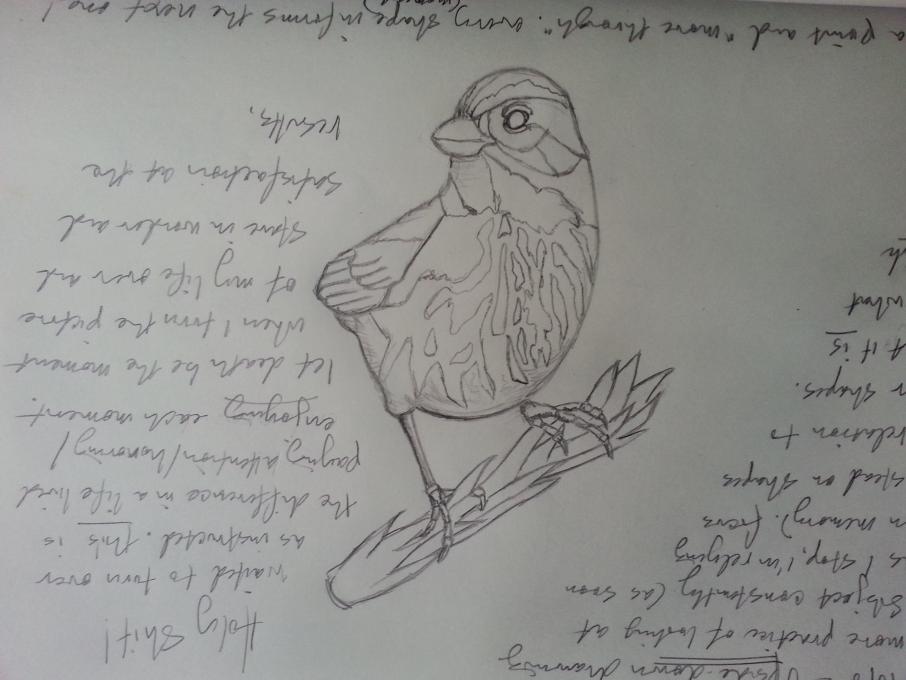
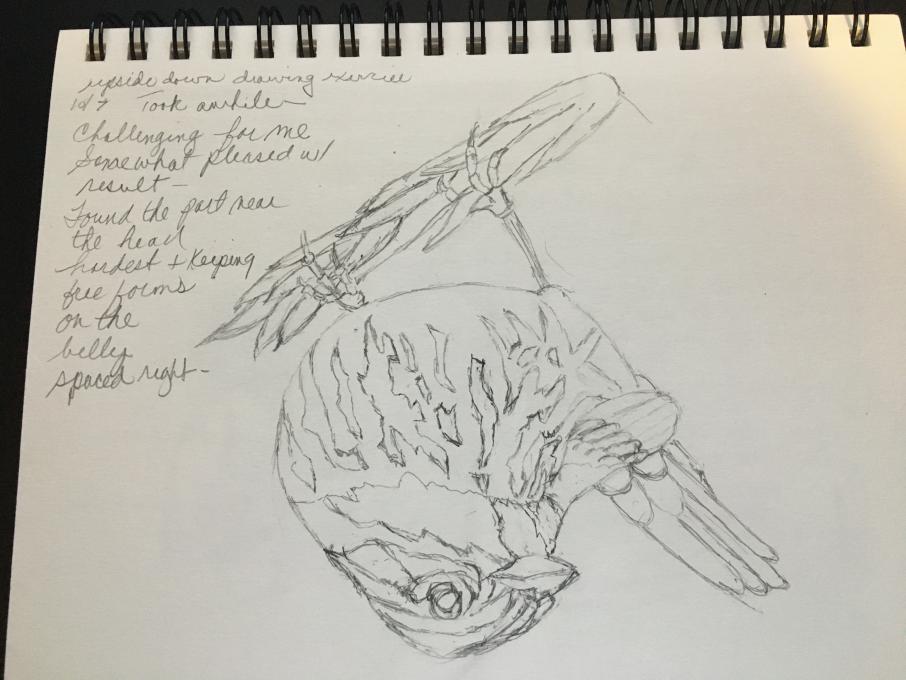
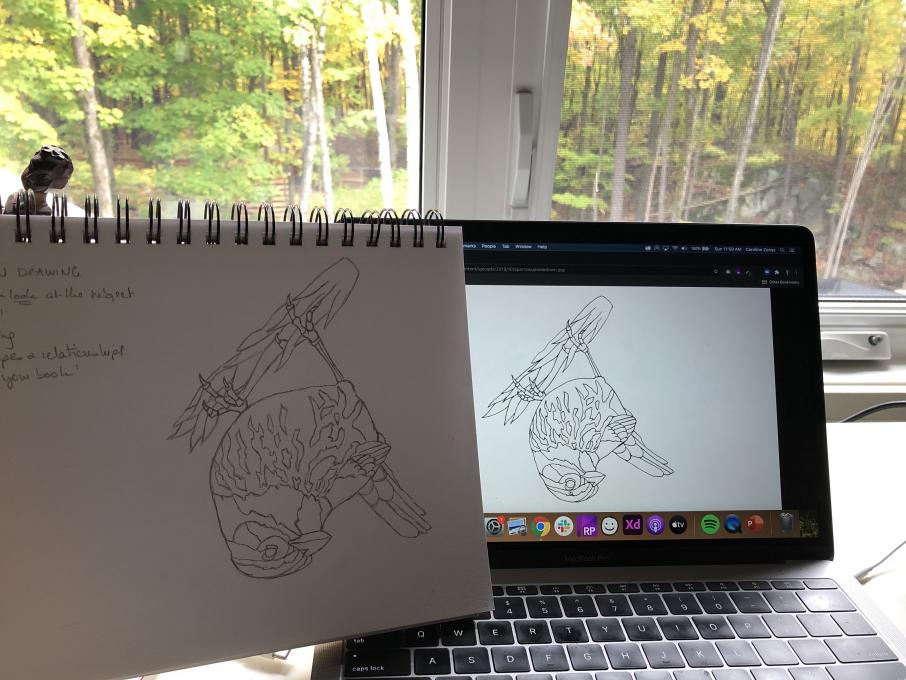
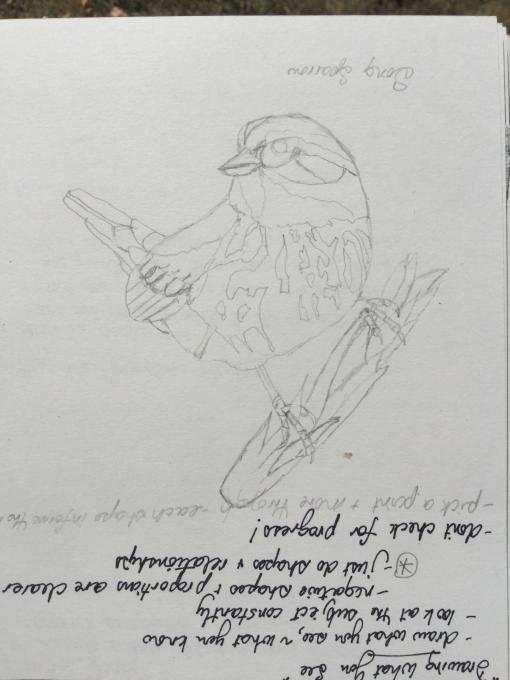
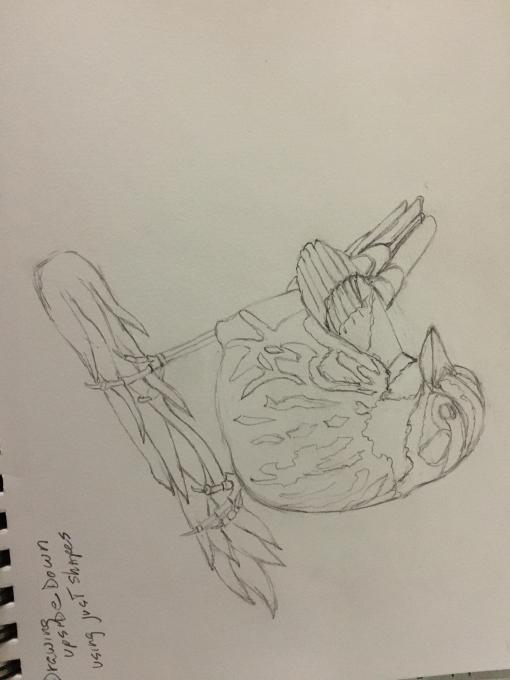
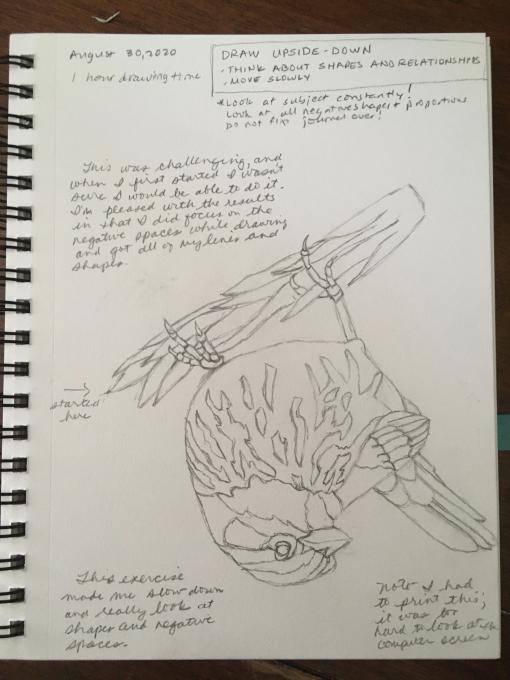 This was challenging for me and when I first started drawing I wasn't sure I would be able to do it. I'm pleased with the results in that I did focus on the negative spaces while drawing and got all of my lines and shapes. This exercise made me slow down and really look at shapes and negative spaces. I found I had to print the picture because it was too hard to look back and forth at the computer screen.
This was challenging for me and when I first started drawing I wasn't sure I would be able to do it. I'm pleased with the results in that I did focus on the negative spaces while drawing and got all of my lines and shapes. This exercise made me slow down and really look at shapes and negative spaces. I found I had to print the picture because it was too hard to look back and forth at the computer screen. 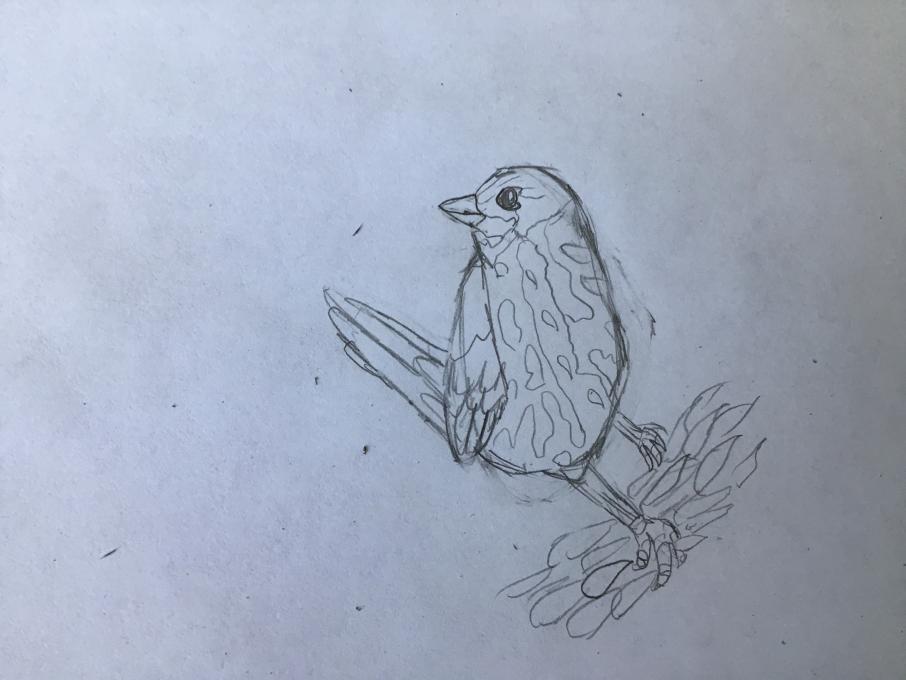 The form of my bird was way off, and I’m not sure what went wrong.
The form of my bird was way off, and I’m not sure what went wrong. 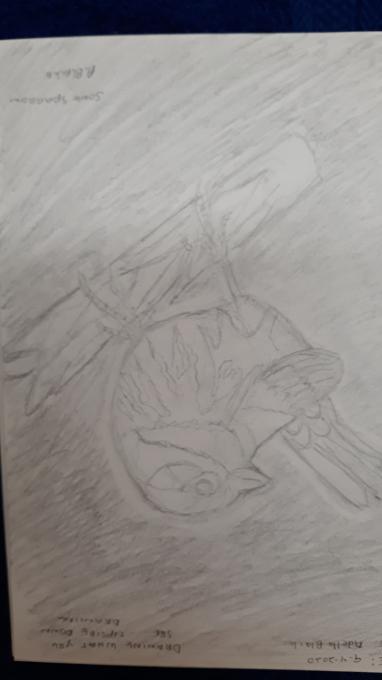
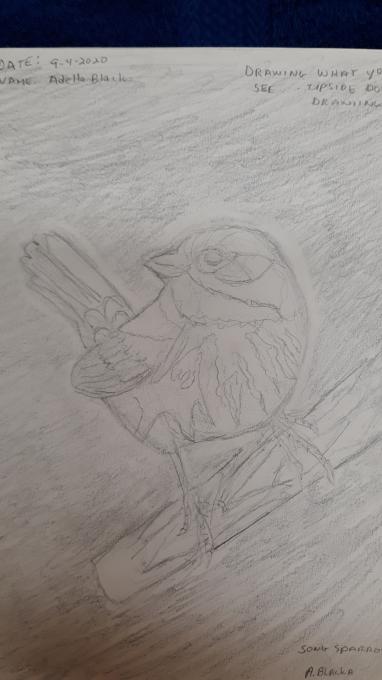
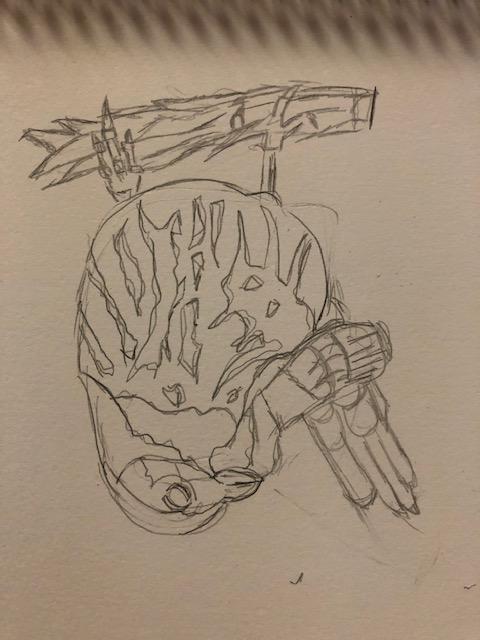 This was difficult ! The longer I drew the more I focused on shapes, lines and portions.
This was difficult ! The longer I drew the more I focused on shapes, lines and portions. 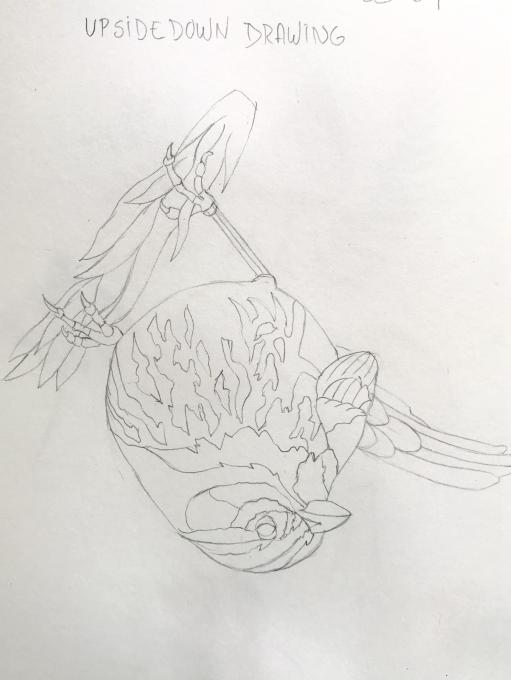
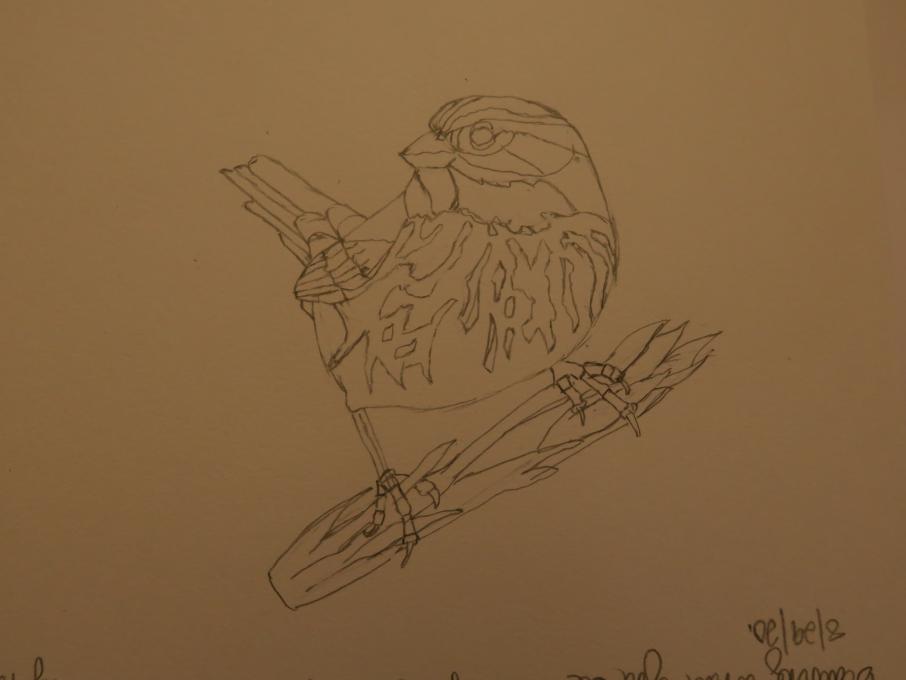
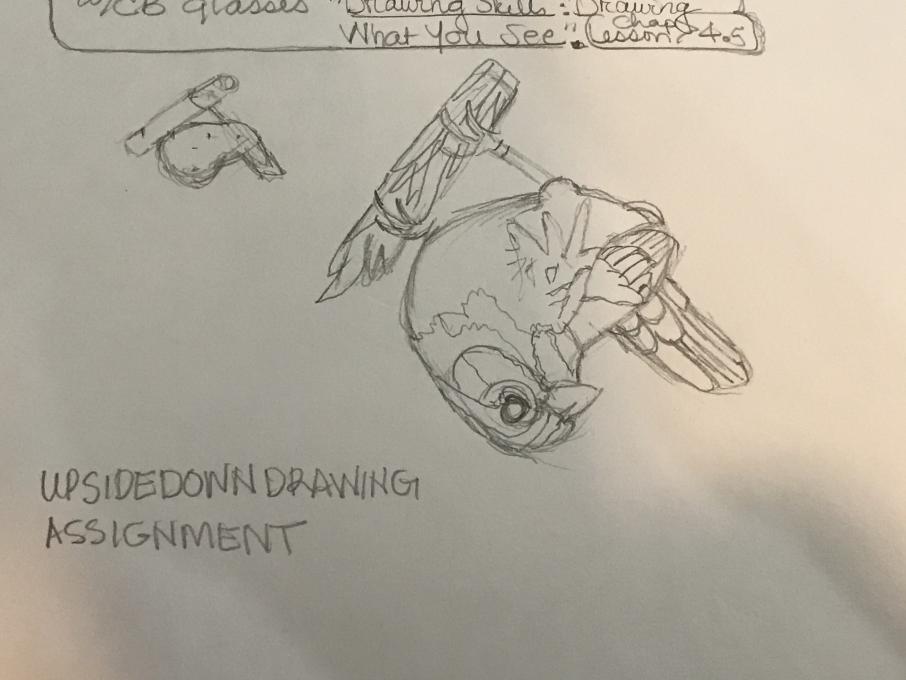
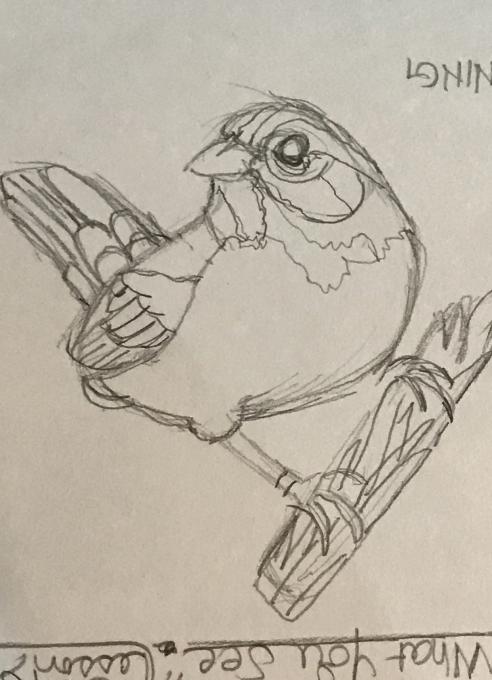 The upside down drawing was not too hard until I got to the belly, then I did not have a way to make associations and relationships, to label and fit in what I was drawing.
I will try understanding the belly feathers again later.
The upside down drawing was not too hard until I got to the belly, then I did not have a way to make associations and relationships, to label and fit in what I was drawing.
I will try understanding the belly feathers again later. 